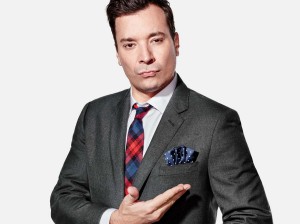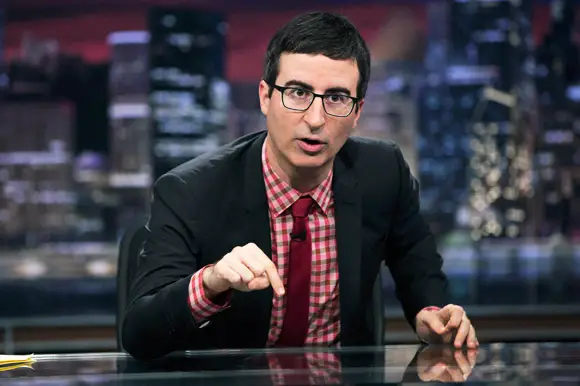Making the Case for the Relevance of Late Night Television
Despite the decrease in ratings and slow death of cable, late night television is more important than ever.
By Andrew Mikula, Bates College
I had a heated debate with a couple of my friends last week about whether or not late-night talk shows were dying.
It’s not exactly an unpopular opinion, after all. Ratings are declining. The pace is slow. The wide-ranging subject matter is often a turn-off for those who want to know what to expect.
Also, I have a confession to make. I lost that debate with my friends. But here I plan on more effectively fleshing out why late-night television is still something to look forward to, especially if you’re a college student.
In recent decades, the internet has given consumers easier access to a greater variety of entertainment. Computers, phones and tablets make the experience of watching shows more interactive (and, if you have a knack for reading YouTube comment sections, perhaps more hostile).
 The web allows users to have more say in what and when they’re viewing something (my parents seem to remind me all the time that they couldn’t just record their favorite programs to watch whenever they wanted). Besides, how else is one supposed to exercise his or her God-given right to read “Study Breaks” articles while on the toilet?
The web allows users to have more say in what and when they’re viewing something (my parents seem to remind me all the time that they couldn’t just record their favorite programs to watch whenever they wanted). Besides, how else is one supposed to exercise his or her God-given right to read “Study Breaks” articles while on the toilet?
To a large extent, the television industry has been forced to embrace use of the Internet. Social media runs rampant with posts from actors, directors and athletes. Odds are, your favorite pop star has his or her own VEVO channel on YouTube. And it’s an odd week when John Oliver isn’t a trending topic on Facebook.
In fact, a lot of programs that operate chiefly through cable still have a sweeping influence on culture. That culture is simply consumed in a different way: online. I never would have began watching Stephen Colbert if it weren’t for YouTube, where “The Late Show” has subscriber totals displayed in 7 digits. It was the same case with “Full Frontal with Samantha Bee,” “Late Night with Seth Meyers” and others. Maybe this shift (from television to Internet) in how people consume media only helps expose this media to new audiences.
Still, I think the talk show format is still on TV for a reason. I personally know many people who don’t like the way that, say, Facebook delivers news to them. “Trending topics” are basically just headlines, and often do little to make readers think in a novel or sophisticated way about the subject matter. Also, I hate to break it to those of you who really think your hometown is that important, but the “trending topics” you see reflect the people you follow, places you’ve been and other interests that Facebook sneakily analyze. Facebook even admits it on one of their “help center” pages no one reads. You probably shouldn’t get all your news from a big company who largely uses “trending topics” to exploit your own sense of selfishness.
Oftentimes, social media sites like Facebook only will reinforce viewpoints you already have. If you like a post or page, the headlines Facebook shows you will tend to include information about that page more often. It’s satisfying to only see headlines that make you feel good about your own interests and opinions, but it can also be restrictive in a way. By limiting your exposure to opposing beliefs or foreign concepts, you’re blunting your judgment and allowing Facebook to turn you into a breeding ground for extremism.
Okay, maybe that was a little melodramatic.
However, it’s a very different story for most late-night talk shows. While oftentimes they have an agenda as well, they’re not tailored to any one person’s opinions. Therefore, they can serve as a great way of challenging people to think about culture and politics differently, often through satire.
This is especially important for college students, whose views on their world are still forming.
Also, talk shows are way more than just the headlines. Instead, they’re a performance: inherently innovative and creative. In an age when newspaper readership isn’t exactly on the rise, late-night talk shows can be a more accessible way of becoming informed about politics and culture in a sophisticated manner. Many collegians even describe talk shows as helping ignite their passion and continued interest in the state of world affairs. All it took was someone who could talk about lead poisoning while simultaneously putting a smile on your face. And yes, in the case of John Oliver, the accent is also a plus.
Viewership has declined even when many talk show hosts seem more clever, intelligent and thought provoking than ever, but maybe that’s only because talk shows are more popular on the Internet. That John Oliver segment on lead has over 4 million views on YouTube, but its debut on HBO garnered an audience of just 850,000. By now, you’re probably getting the memo that I love John Oliver, but this disparity between popularity on TV and on the internet is also true for other shows.
Jimmy Fallon, for example, has almost three times as many subscribers on YouTube as his average nightly TV viewers this season. The fact that so many viewers still prefer this timeless talk show format, even if they’re viewing it through a new medium, reflects a sort of competition between convenience and depth of knowledge.
Scrolling through your Twitter feed represents the convenience side. It’s likely that any “news” you gain from 140-character posts will be superficial and objective. There are also a lot of shock-value “news” channels on YouTube that rely on sleazy celebrity news or clickbait. My general rule of thumb is that if the most popular videos on a channel are mostly about sex, drugs or “gotcha” celebrity scandals, the channel probably isn’t going to be very informative.
Talk shows, on the other hand, are much less likely to be overblown, exaggerated or fabricated. For all the internet’s perks, television still wins on reliability (just look at the large number of vloggers and Internet personalities who frequently fall behind on their upload schedules). And it’s this same sense of intelligent and trustworthy news that can be so important for young people used to the immediate (though dubious) satisfaction of reading short headlines.
College represents a unique opportunity for a lot of people to reform their relationship with the outside world, having been far removed from the ideologies that hometowns and family have thrust upon them. Learning to challenge the deep-seated beliefs of yourself and others starts with watching others do it first. Now if you’ll excuse me, Samantha Bee has a new video out.















[…] Reading: Popularity of Talk Shows, Millennials and Talk Shows […]